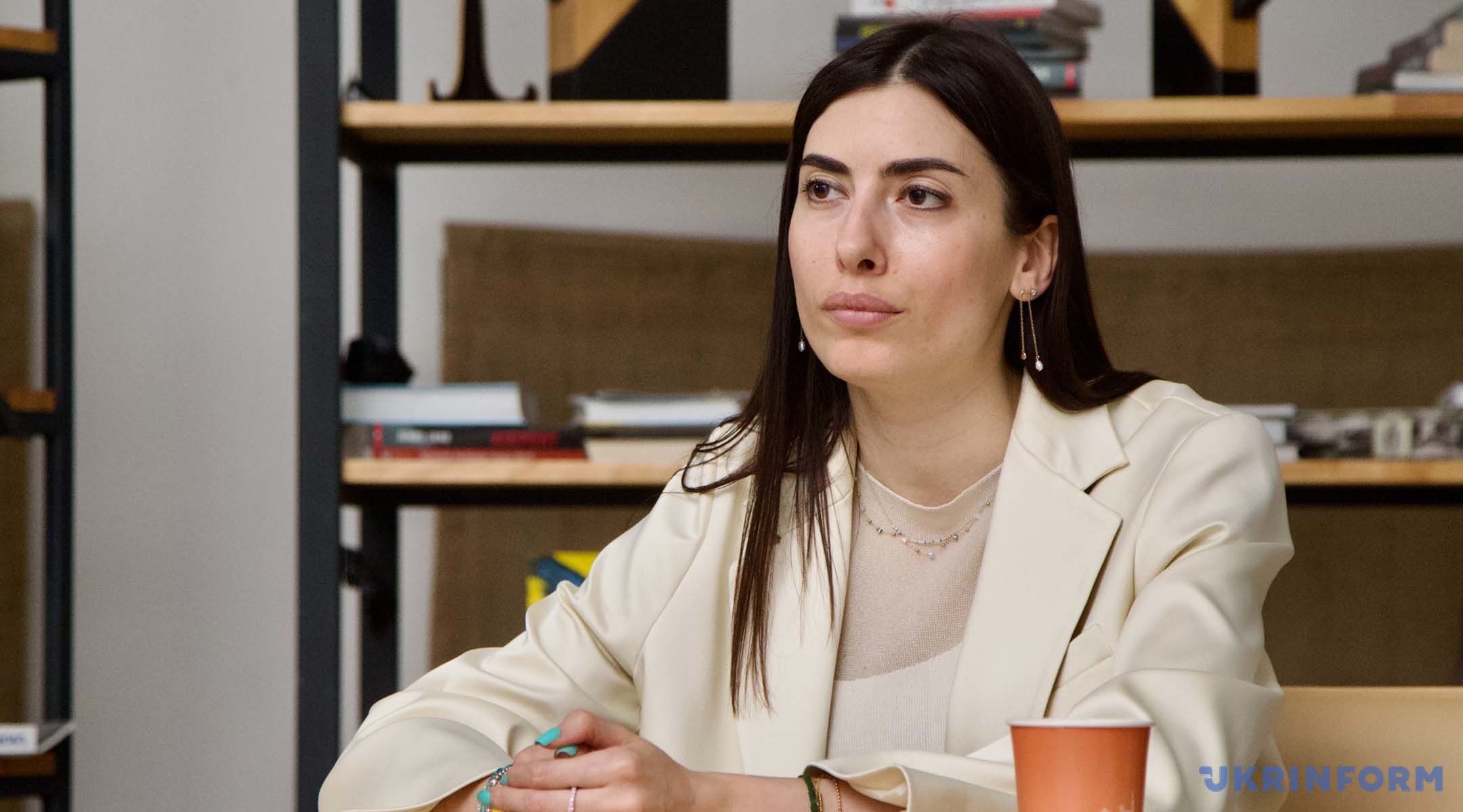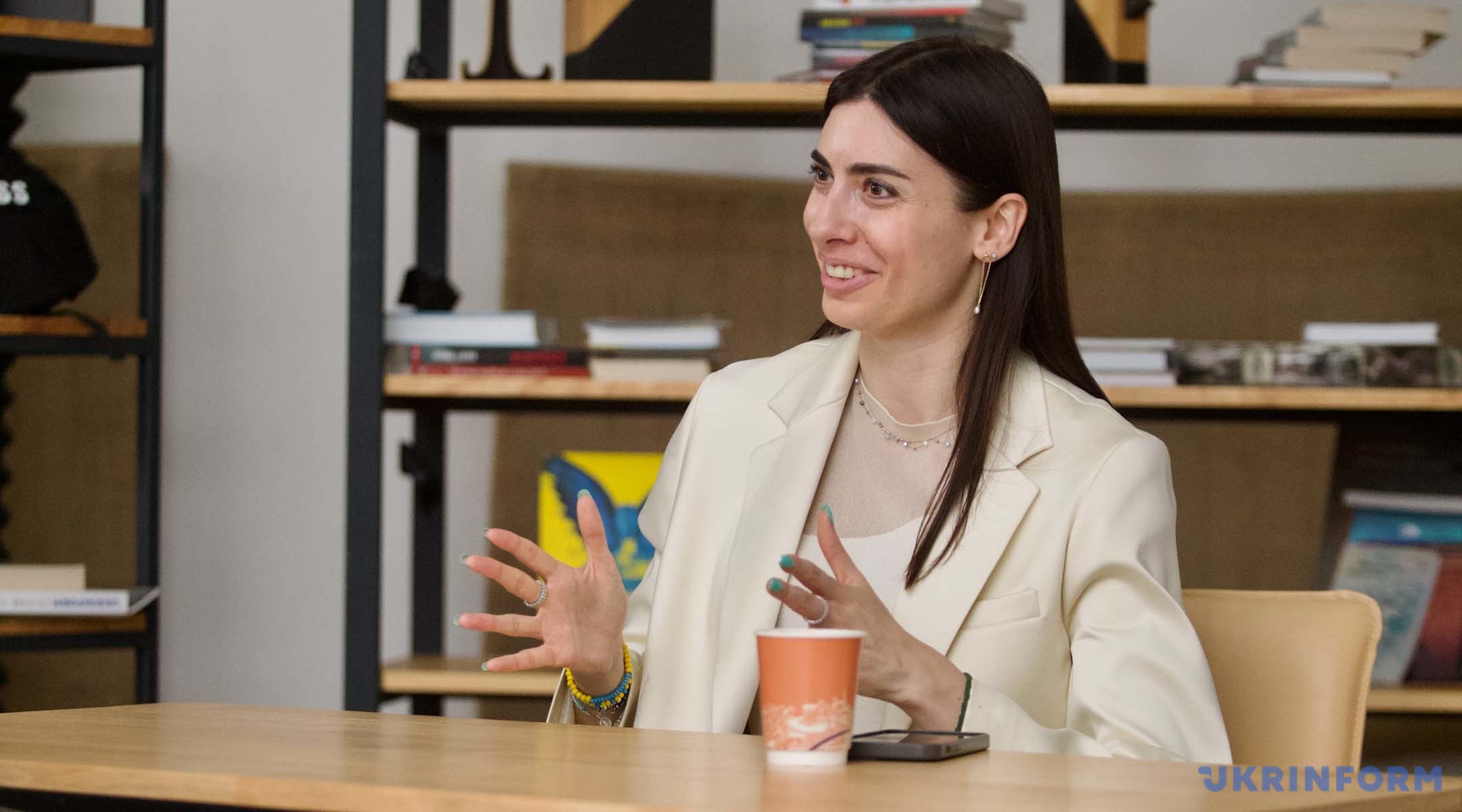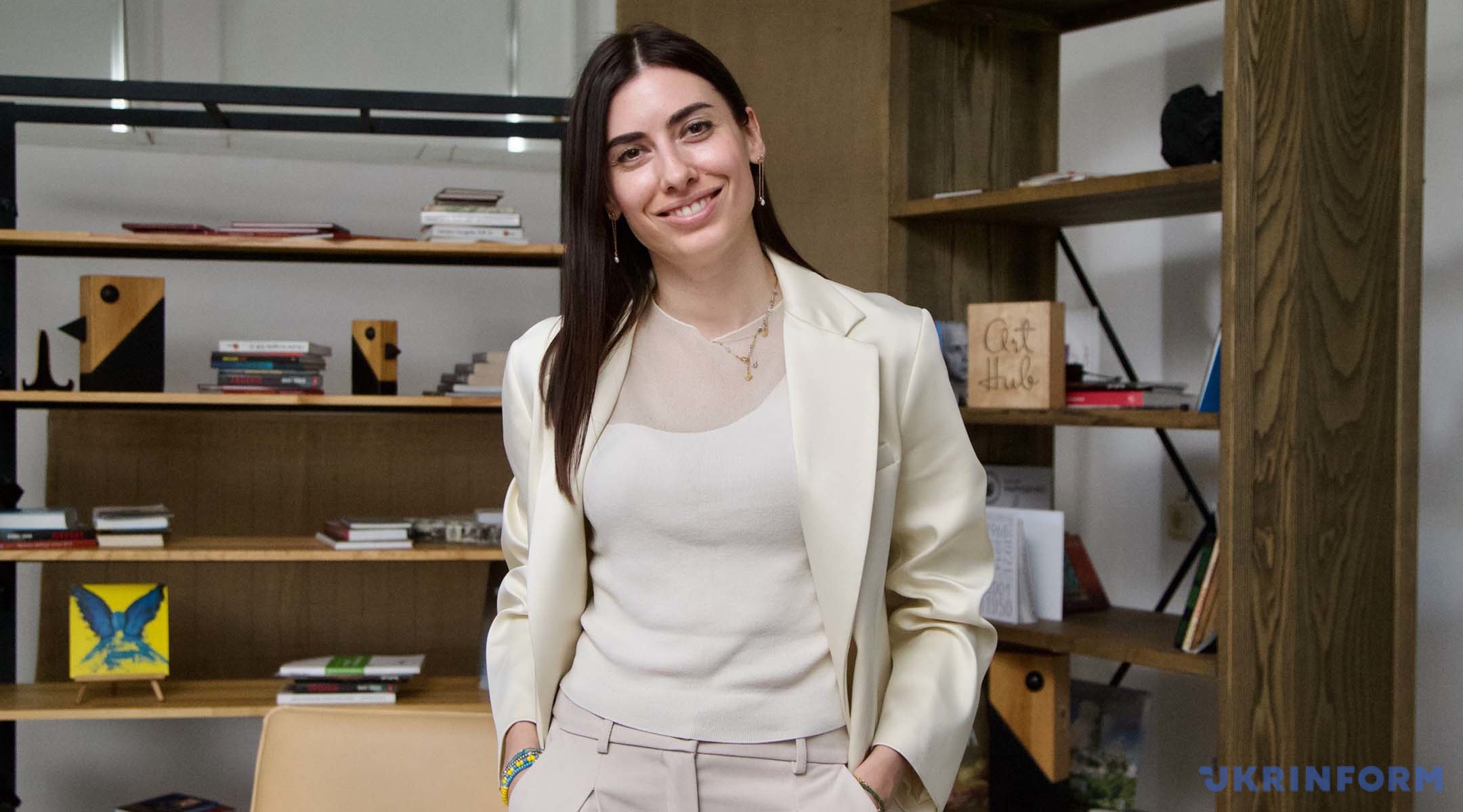Ukrainian matters have become an indispensable part of the summer session of the Parliamentary Assembly of the Council of Europe (PACE). This is logical as the Russian Federation’s aggression against Ukraine requires a single response from the international community, and the Parliamentary Assembly of the Council of Europe plays a vital role in this context.
Ukrinform spoke to Ukrainian MP, Chair of the Ukrainian Delegation to PACE Mariia Mezentseva, on the work of the Ukrainian delegation at the PACE summer session, non-admission of Russian and Belarusian athletes from Russia and Belarus to the 2024 Olympics, recognising “Wagnerites” and “Kadyrovites” as terrorist groups, as well as Ukraine’s fulfilment of the requirements for the accession to the European Union.
I BELIEVE WE WILL DEPRIVE THE RF AND RB OF THE RIGHT TO PARTICIPATE IN THE 2023 OLYMPICS
- The EU-Ukraine summit in February this year dealt with the issue of the Ukrainians’ continued residence in European countries. Tell us what happened after this discussion in practice.
- Our ad-hoc working group held numerous dedicated meetings related to the stay of Ukrainians abroad. For instance, education issues. It is vital that Ukrainian children are able to continue their normal education during their stay abroad.
We also discussed how we can continue providing free roaming for temporarily displaced persons. By the way, the most recent PACE resolution adopted on 23 June says that all 46 states must provide free Internet access to those who require it, particularly for the purpose of educating children and children with special needs, as well as for people with the status of a temporarily displaced person or refugee.
Noteworthy, we do not consider Ukrainians to be refugees. During my speech at the PACE, I reiterated that we were introducing a new legal concept of “temporary relocated persons.”
Furthermore, we discussed whether payments to temporarily relocated persons were fair and whether they corresponded to the format originally proposed by the European Commission.
The PACE has a separate Committee on Migration, Refugees and Displaced Persons, which is now gaining considerable weight because numerous resolutions pass through this committee. Within its limits, the Ukrainian Parliamentary Delegation tries to consider everything that concerns Ukrainians.
At the same time, I want to emphasize that recently we have been observing positive dynamics in terms of the return of Ukrainians from abroad. This is incredibly satisfying. We are waiting for all Ukrainians home.

- On 22 June, PACE adopted the resolution banning athletes from Russia and Belarus from the 2024 Olympics. How did the Ukrainian delegation defend the need to adopt such a resolution? Can it influence the decision of the International Olympic Committee?
- Our delegation was lucky. With Yevheniia Kravchuk (Deputy Chair of the Servant of the People faction in the Verkhovna Rada, member of the Ukrainian Delegation to PACE – Ed.), we chair very important committees. I chair the Committee on Equality and Non-Discrimination and Yevheniia – the Committee of Culture, Science, Education, and Media. This document was passed under the chairmanship of her committee. Furthermore, former Minister of Sports of Norway, Linda Hofstad Helleland, who is actively speaking out for banning athletes from Russia and Belarus from the 2024 Olympics, was among the authors of the resolution.
98% of speakers supported the resolution. In their speeches, they emphasized that it was impossible to negotiate with Russia and Belarus. Hence, the document stresses that Russian and Belarusian athletes cannot participate in the Olympics, even under a neutral flag.
We will see what happens in Paris in 2024, but I may already note that MPs from President Emmanuel Macron’s party informed him right after the meeting that admitting Russian and Belarusian athletes would hurt France’s image.
Naturally, it is not solely contingent on the nation that hosts the Olympic Games. This idea was taken very seriously by representatives of the International Olympic Committee. I think this is a significant signal and, at the same time, a considerable international pressure, considering that 46 countries make up almost a quarter of the planet. I am convinced that we will deprive Russia and Belarus of the possibility to participate in the Olympics.
ACTIVE WORK WAS DONE IN PACE BEFORE THE NATO SUMMIT IN VILNIUS
- In June, the PACE adopted the resolution “Political Consequences of the Russian Federation’s Aggression Against Ukraine,” which supported Ukraine’s accession to the North Atlantic Alliance. How was the work going on in the PACE before the Vilnius summit?
- Chair of the Lithuanian Delegation to the PACE, one of the biggest friends of Ukraine, Emmanuelis Zingeris, called me on the eve of the resolution finalisation and said, “Mariia, I will go all-in and register support for Ukraine’s membership in NATO at the Vilnius summit.” I told him that this decision might not be supported by all members of the Parliamentary Assembly of the Council of Europe, as some colleagues still claimed that PACE was mostly a “human rights organisation.”
In addition, there is a NATO Parliamentary Assembly, which works, among other things, on the matter of Ukraine’s accession to the Alliance. Yet, we wanted to support them, so we included a statement in the resolution saying that 46 states supported Ukraine’s unconditional, full-fledged accession to NATO but left out the clarification about the Vilnius summit.
During the consideration of this resolution in the political committee, some MPs hesitated and discussed minor amendments for some time. I was present at the meeting, and although I am not a member of the political committee, I told my colleagues that while they were hesitating, Ukraine was suffering from war. We’re all too familiar with the occasional “falling asleep” or “stumbling” of European lawmakers, but we do our best to agitate them.
An event held with released POW musicians was part of such agitation. This project was called “Bring the band home.” Well-known POWs from Azovstal participated in it. We attempted to relay the true tales of the Ukrainian soldiers freed from captivity and their loved ones. This event was organised jointly with the Coordination Headquarters for the Treatment of Prisoners of War. I believe this event was really affirmative and had a massive impact on PACE MPs.
In reference to the resolution, it is noteworthy that it contains a request for the International Red Cross to fulfil its mandate. We’re trying to explain this to the European MPs by focusing on children who’ve been deported by Russia through illegal means. Although the International Rescue Committee is able to provide Ukraine with information on the placement of Ukrainian children in Russia, this is not happening. This must be resolved.
Additionally, the resolution mentions the International Register of Damage Caused by the Aggression of the Russian Federation Against Ukraine. More than 40 countries and all G7 states have already signed the document upon its creation. We are expecting the Register to start functioning already this summer in the Hague. The Office is ready to work.

WE MUST CREATE A REGISTER OF COUNTRIES AND BUSINESSES HELPING RUSSIA BYPASS SANCTIONS
- The PACE also approved a resolution recognising the “Wagnerites” and “Kadyrovites” as terrorist groups. What impact will this have on these military structures and Russia in general?
- The PACE recognised Wagner PMC and the "Kadyrovites” as terrorist organisations because they are directly connected to the Russian Federation and are fighting against Ukraine on its side. The world should tighten its sanctions against Russia and the terrorist organisations it funds. This will help diminish Russian resources in the waging of its aggressive war against Ukraine.
Unfortunately, we observe that Russia continues to accumulate drones and missiles. This is becoming possible thanks to bypassing sanctions. As a result, we are now compelled to discuss the lists of those who avoid sanctions, as well as those who assist Russia in bypassing sanctions.
- When may such a register be launched?
- We came up with the idea that we should make a register of countries and companies that not only avoid sanctions but also assist in doing so. They act as a third party in cooperation with the Russian Federation, even though they declare non-involvement. They purchase individual goods, components, and technologies and are considered the final recipient, but in reality, they transfer everything to Russia. Thus, the Russian Federation retains some access to goods and services that it should not be able to receive due to sanctions.
A separate item in this context is Russia’s cooperation with Iran. I intend to discuss the issue of Iran’s assistance in the Russian aggression against Ukraine with my PACE colleagues. This indicates that the international community continues to support Ukraine.
Many assert that the level of support extended by international colleagues has decreased significantly. Nevertheless, I can assure you that it is continually growing.
INTRODUCING THE POSSIBILITY OF HAVING DUAL CITIZENSHIP IN UKRAINE IS FAIR
- How is Ukraine’s European integration into the European Union going?
- We are fulfilling absolutely all the requirements of our European partners. The parliament adopted in the first reading draft law No. 9322, “On Amendments to Some Legislative Acts of Ukraine Regarding Clarification of the Provisions on the Competitive Selection of Candidates for the Position of Judge of the Constitutional Court of Ukraine.” The document specifically states that three candidates from Ukraine and three from foreign partners will be included in the special committee responsible for selecting judges. Now, this document should be adopted in the second reading.
We are also working on anti-corruption reform. We need to return electronic declarations, which were suspended because of a full-scale war. The relevant document has been registered. All we need to do is vote for it in the session hall. Meanwhile, the parliament has already voted for all the important appointments in this area.
Another important requirement of the European Commission concerns national minorities. I will explain why the rights of national minorities have become an obstacle to Ukraine’s membership in the European Union. This item was added by the Hungarian party. Let me remind you that the minister for EU enlargement is Hungarian. Our Hungarian partners have been waging a long-running debate about the status of national minorities, particularly in the realm of education.
There are currently over 100 schools in Ukraine that teach children in their native language, which is Hungarian. They should also learn the state language since admission to higher educational institutions and employment in Ukraine depend on it.
Another obstacle for national minorities is that they can’t have dual citizenship in Ukraine. I am of the opinion that the draft law regarding dual citizenship will be registered in the parliament as it would be fair. These citizens exist, they must be “legalized.” We are moving towards the EU, and it is possible to have more than one passport there.
Vice Prime Minister for European and Euro-Atlantic Integration Olha Stefanishyna and the Ministry of Culture and Information Policy are currently actively working on this matter.
A new resolution will be drafted based on my PACE Committee on Equality and Non-Discrimination. It is called “The Situation of National Minorities in Ukraine.” Hearings on this document will be held jointly with the Venice Commission at the PACE’s October session.

- What European integration draft laws are currently being worked on in the parliament? When will they be considered in the session hall?
- The Verkhovna Rada Committee on Ukraine’s Integration into the European Union is quite busy; We have weekly online committee meetings. We always have about 30–40 draft laws on the agenda. Each requires a thorough examination to ensure compliance with all essential directives and regulations. It is difficult to pinpoint specific initiatives, but the work is ongoing.
Furthermore, it is important to continue responsible international cooperation, both at the regional and at the highest levels, in addition to adopting draft European integration laws.
- Please describe Ukraine’s relations with the countries of Latin America, Africa, and Asia, given the importance of continuing active international cooperation.
- Regarding Africa. Prior to the onset of the full-scale war between Russia and Ukraine, diplomacy with African nations was typically conducted through the student sector. Eighty-eight thousand students from that region studied in Ukraine. Currently, as foreign students have departed from Ukraine due to the war, this avenue of collaboration has experienced a significant decrease, despite not being completely closed.
In the present time, a large delegation of African nations has recently arrived in Ukraine. They met with the President of Ukraine, government officials, and MPs, and talked about issues of war and cooperation.
Earlier this year, the President of Ukraine and the Ministry of Foreign Affairs invited and initiated new competitions for ambassador positions in Africa and Latin America. We are awaiting their results. These countries are difficult to cooperate with, but I believe that once ambassadors are appointed, it will facilitate communication attempts. We need a continuous connection with these states. For example, Ethiopia did not want to accept our grain containers. This issue took time to resolve because direct communications through the Office of the President of Ukraine and the leadership of Ethiopia were ongoing. If we had a permanent representative there all the time, we could solve all problems faster.
The Ukrainian President has given representatives of the Ministry of Foreign Affairs and parliamentary diplomacy clear instructions to continue the cooperation with the mentioned countries. We are working in this field.
- In your opinion, what methods for establishing relations and cooperation with these countries are the most efficient?
- Certainly, as the authorities, we understand that it is important to talk about the war in an entirely different context. In the case of Africa, this can be done by providing food, helping with the agrarian industry, technology, and student education.
Maryna Shykarenko, Kyiv
Photo by Kyrylo Chubotin
